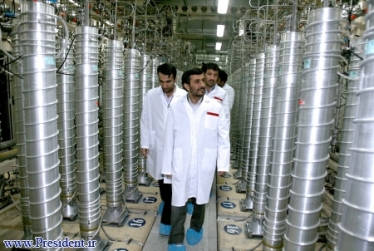Construction of Iran's heavy water reactor is progressing, while authorities in the country will not allow the IAEA access to the facility.
 |
| President Mahmoud Admadinejad puts the spotlight on enrichment work at Natanz last year, but this is now the least of the world's concerns on Iran |
Initially, concern was focused on Iran's uranium enrichment work which could potentially be abused to create fuel for nuclear weapons. The UN Security Council ordered this work to stop, but Iran has continued. However, all the materials and facilities connected with that program are under tight surveillance by the IAEA, which has made 21 unannounced inspections of the main Fuel Enrichment Plant since March 2007.
The most serious questions remaining for Iran relate to the 'alleged studies', on which the IAEA has been given information by several other states. These include apparent evidence of precision high-explosive development, underground testing arrangements, research into uranium tetrafluoride and modifications to a missile re-entry system.
Iran has copies of some of these documents and maintains they are fakes but is refusing to allow the IAEA to meet the researchers concerned or to state which parts of the allegations, if any, are true. ElBaradei urged the states that provided the information to permit copies of more documents to be given to Iran.
Heavy water
Iran is a signatory to the Nuclear non-Proliferation Treaty and its Additional Protocol (AP), which should allow IAEA inspectors free access to any facility, not just declared nuclear sites, on short notice. However, access to the IR-40 heavy-water reactor under construction at Arak has been refused more than once on the grounds that it does not yet contain any nuclear materials. Iran told the agency that it would continue to refuse as long as that condition was the case.
This non-implementation of the AP has left the agency frustrated. ElBaradei noted that it would be difficult to assess the true state of construction work, or whether the actual design of IR-40 differs from what Iran has said. The situation has been compounded by the completion of the facility's roof, which obviously limits satellite observation.
The fuel pellet production plant for IR-40 is operational with fuel rods currently in production. The heavy-water production plant also seems to be in operational condition.
Construction on Iran's nuclear power plant at Bushehr by Russian contractors continues, albeit delayed. The IAEA said that the fuel for the unit, delivered by Russia a year ago, remains under seal. It is expected to be loaded in the second quarter of this year, with operation following in 2010.




_91467.jpg)
_47120.jpg)

_23621.jpg)





